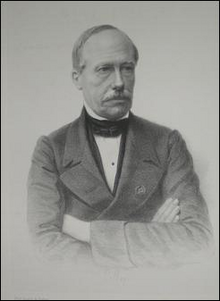Charles de Brouckere
Charles Marie Joseph Ghislain de Brouckère (born January 18, 1796 in Bruges , † April 20, 1860 ) was a southern Dutch, later Belgian statesman . He was the brother of Prime Minister Henri de Brouckère .
De Brouckère joined the Dutch artillery in 1815 and fought at Waterloo , but in 1820 went into the civil state service in the administrative and financial sector. In 1826 he was elected deputy of the Limburg Province in the Second Chamber of the States General , and he became the head of the liberal opposition and champion of Belgium's independence . After the decree of the royal embassy on December 11, 1829, he resigned from the civil service.
After the decisive September battles of 1830 in Brussels , after his attempt to keep Belgium from the Orange had failed , he spoke as a member of the Constitutional Commission for the maintenance of the monarchy and voted in the National Congress for Louis d'Orléans, duc de Nemours, as king . Head of the Finance Committee under the Provisional Government, he quickly put the finances in order, was appointed Minister of the Interior by King Leopold I on August 3, 1831, and Minister of War on August 16, 1831. Within a few months he created an army of 80,000 men; But when the chambers criticized the size of the sums demanded and even suspected his unselfishness, he demanded his dismissal in March 1832.
In 1834 he took over the position of general director of the mint and, since it did not meet his thirst for activity, a professorship at the University of Brussels without a salary and established the Répertoire de l'administration et du droit administratif with Jean-François Tielemans . In 1835 he founded the Belgian National Bank, which, however, had to stop its payments due to the political constellation in 1838, which is why de Brouckère, although the government of the bank came to the aid, resigned the directorate on April 30, 1839. He was torn from his calm, which he used to promote industrial enterprises, when he was re-elected to the Chamber in Brussels in 1840. At the end of 1840 the Minister Charles Rogier appointed him mayor of the capital, as which he made a great contribution to the inflation of 1846 and the cholera of 1849. In 1847 he was president of the Congress of Economists in Brussels and in 1848 of the Agriculture Congress there. In general, he was one of the most active and insightful members of almost all commissions and committees officially appointed to raise or assess the industrial performance of the country. He rejected the title of count conferred on him by the king. He died on April 20, 1860.
De Brouckère was a member of the Freemasons Association .
Individual evidence
- ^ Société Royale Belge de Géographie, Itinéraire de la franc-maçonnerie à Bruxelles, in Hommes et Paysages, 31, IGN, Bruxelles, 2008, ISBN 978-2-9600712-2-1
- ^ List of Belgian Freemasons
Web links
| personal data | |
|---|---|
| SURNAME | Brouckère, Charles de |
| ALTERNATIVE NAMES | Brouckère, Charles Marie Joseph Ghislain de (full name) |
| BRIEF DESCRIPTION | Southern Dutch, later Belgian statesman |
| DATE OF BIRTH | January 18, 1796 |
| PLACE OF BIRTH | Bruges |
| DATE OF DEATH | April 20, 1860 |
